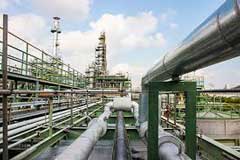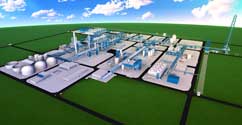PRA Chinese
Rubber Journal Asia Injection Moulding Asia Energy, Oil & Gas Asia
VISIT OUR OTHER SITES:
PRA Chinese
Rubber Journal Asia
Injection Moulding Asia
Energy, Oil & Gas Asia
Plants: BASF expands capacity for Neopentylglycol; MOL/Thyssenkrupp break ground on EUR1.2 bn polyol complex in Hungary

German chemical firm BASF has increased the capacity of its neopentyl glycol (NPG) plant in Ludwigshafen, Germany, by 10,000 tonnes/year. Thus, the company has a total of 215,000 tonnes of NPG capacity with facilities in Ludwigshafen, Freeport/US, Nanjing and Jilin/China. In addition, BASF is currently expanding its NPG capacity at the Nanjing site by a further 40,000 tonnes available from 2020, as announced in December 2017. With NPG production facilities in Europe, Asia and North America, BASF is one of the world's leading NPG manufacturers.
"The production expansion in Ludwigshafen underlines our clear commitment to continuously support the growth of our European customers," says Michael Britt, Senior Vice President of Acids and Diols in BASF's Intermediates division.
Due to its high chemical and thermal stability, NPG has proven itself in many applications, especially in the production of polyester and alkyd resins for various coatings and plastics. An essential field of application is powder coatings, which prove particularly successful in the construction industry as well as in the coating of household appliances.

Oil and gas company MOL Group is investing a total of EUR1.2 billion in a new polyol production plant complex in Tiszaújváros, Hungary, which is expected to go into operation in 2021 and produce around 200,000 tonnes/year of polyols. German industrial firm Thyssenkrupp is building the integrated chemical complex, with foundation laid recently.
"Today's laying of the foundation stone is an important step for the transformation of the chemical industry in Hungary and for the partnership between MOL and Thyssenkrupp," Sami Pelkonen, CEO of Chemical & Process Technologies at Thyssenkrupp Industrial Solutions. "With its Vision 2030, MOL is pursuing an ambitious growth agenda. We are proud to support this vision and to contribute with our technologies and know-how to an innovative and sustainable chemical sector. "
Polyol is an important and highly demanded raw material for plastics, which is used in many industries - from automotive to construction to the textile industry. Polyol will be produced in the new plant complex in Tiszaújváros using the HPPO process (propylene oxide from hydrogen peroxide) developed by Thyssenkrupp and Evonik.
"With this investment project the MOL Group becomes one of the most important regional players in the chemical industry. MOL will be the only company in Central and Eastern Europe that covers the entire value chain from crude oil production to polyol production,” said Zsolt Hernádi, CEO of MOL. "After commissioning in 2021, the plant will contribute to strengthening the chemical site of Tiszaújváros. The know-how and the newly emerging infrastructure can attract further investors to the region in the future. "
(PRA)Subscribe to Get the Latest Updates from PRA Please click here
©2019 Plastics and Rubber Asia. All rights reserved.

©2019 Plastics and Rubber Asia. All rights reserved.
Home Terms & Conditions Privacy Policy Webmail Site Map About Us























